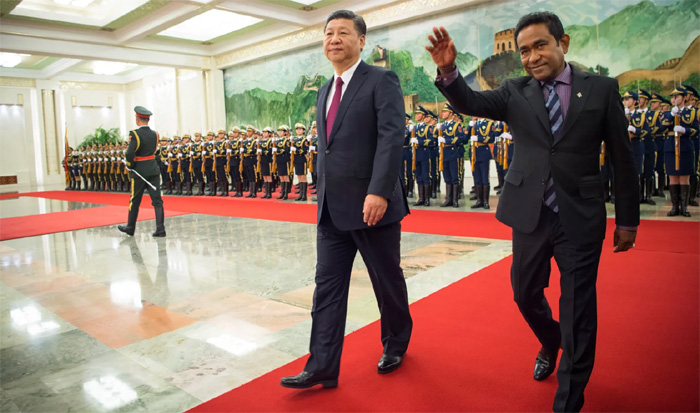Xi Jinping projects dominance in Indian Ocean, names 19 sea bed features
Signalling expansionist intentions and its rise on the global stage, China delivered a double whammy to India on April Fool’s Day and the next by directly meddling into India’s sovereignty and its area of influence in the Indian Ocean region.
A day before China under paramount leader Xi Jinping renamed 11 sundry geographical locations in India’s Arunachal Pradesh on April 2, which was promptly rejected by New Delhi, it named 19 sub-surface features in the South Indian Ocean, some 2,000 kilometres away from the Indian peninsula. Albeit the Chinese propaganda media has called it a projection of Beijing’s “soft power”, the earmarking of territory far away from Chinese mainland after the China Ocean Mineral Resources R&D Association (COMRA) was awarded an exploration contract of 15 years by the International Seabed Authority in 2011 in South-West ridge of the Indian Ocean near Madagascar. It is another matter that India was also awarded exploration work north of the Chinese exploration blocks on the same South-West Ridge of the Indian Ocean for precious metal polysulphide modules.
“The renaming of sundry geographical locations in Arunachal Pradesh and in the deep Indian Ocean is reflective of the Middle Kingdom mentality of the Communist Party of China (CPC) and mirrors the British Imperial approach in the 19th century to project dominance and power. Even diplomats posted in China are given mandarin names while presenting their diplomatic papers,” said a South Block official.
Out of the 19 seabed features named in the Indian Ocean, six features are off the coast of Oman and the Chinese port of Djibouti off African horn, four features are off the coast of Madagascar, eight are on the south-west ridge of the Indian Ocean and one feature is east of the ridge feature in deep Indian Ocean towards Antarctica.
Six of the features namely Bangu Knoll, Huapengu hill, Langzhangg Hill, Shugu Hill, Tanggu Hill and Zhangu Hill were proposed by the China Navy Hydrographic Office in 2021. Other features namely Yaogu Seamoount and Yugu Hill were proposed by the Navy Hydrographic Office in 2020, and another one Houxian Seamount was proposed by COMRA in the same year. One feature namely Sanboa Hill was proposed by COMRA in 2019, another one namely Tainlong Seamount was proposed by COMRA in 2018 and approved by the Xi Jinping regime. Four features were proposed by COMRA namely Daxi Hill, Duanqiao Hill, Fengyan Seamount, Wangdayuan Seamount in 2017 and approved by Beijing.
Three features (Liezu Seamount, Wanwu Ridge and Yuqing Seamount) were proposed by COMRA in 2016 and one (Yang’e Rudge) in 2015. All these sea features were named on the basis of surveys done by Chinese research vessels, for instance the Bangu Knoll was discovered by Chinese vessel Chen Jingrun Hao in 2019 and proposed in 2021. There was ocean-bed surveillance done by vessels like 877 Hao, Zhu Kezhen Hao, Li Singuang Hao, Qianglong Erhao and a couple of others as per the annexures reviewed by the Hindustan Times.
According to a national security planner and a former Indian foreign secretary who served in China, the renaming of geographical entities in Indian Arunachal Pradesh is to show that the area is disputed by Beijing as Zhangnan or South Tibet but the naming of features in the Indian Ocean is to project dominance in the Indo-Pacific. The fact is that before staking an unlawful claim over the entire South China Sea, China started renaming islands; the atoll Woody Island was renamed as Sansha City.
New Delhi and its friends have noted these events with concern and an answer to the Middle Kingdom’s imperial mentality is expected soon, Indian officials said.


Comments are closed.